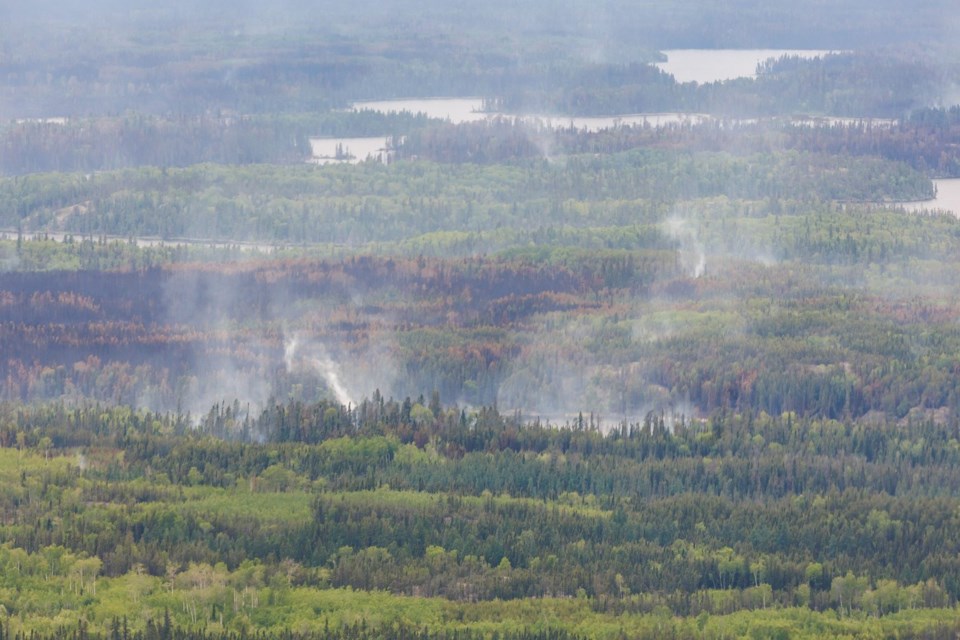WINNIPEG — The Manitoba government declared a provincewide state of emergency Thursday for the second time this year, as renewed wildfires forced thousands more out of northern communities.
With the latest round of fires and evacuations, the province said more than one million hectares have burned — more than 10 times the average over the last 20 years.
"This is the worst year in our 30-year electronic record," said Kristin Hayward with the Manitoba Wildfire Service.
In total, about 12,600 people are out of their homes in Manitoba.
The government gave notice that it intends to use Winnipeg's major convention centre to house evacuees. With the ability to line up cots in its large rooms, the centre has capacity for up to 7,000 people.
The Red Cross and provincial government are also housing people at a large indoor soccer complex in Winnipeg.
"The reality is that people who evacuate in Manitoba now will be heading to congregate shelters for the most part," Premier Wab Kinew said.
"We have some number of hotel rooms to deal with elders, to deal with really high medical needs .... but the vast majority of folks are going to be going to congregate settings."
The military stepped in Wednesday evening with a large Hercules transport plane to fly people out of Garden Hill First Nation as fires approached. The community of more than 3,000 residents is some 500 kilometres north of Winnipeg and not accessible by road.
Snow Lake, a town 600 kilometres northwest of Winnipeg, also issued a mandatory evacuation order for its 1,000 residents. It's the second time this season they have been told to leave.
Snow Lake Mayor Ron Scott said it's frustrating to have to go again.
"We anticipated that this was going to be a very long, painful summer with the very dry conditions, windy conditions," Scott said.
"There's fires all over the place."
A major blaze was within 16 kilometres of the town and wind was blowing it toward the community, he said. The highway south was open and people were leaving in an orderly fashion, he added.
The 600 residents of Lynn Lake were ordered out last week for the second time. About 350 residents in Leaf Rapids were told to leave earlier this week.
Manitoba wildfires first flared up in May. At one point, 22,000 residents were out of their homes, including everyone in Flin Flon, near the Saskatchewan boundary, and thousands in Pimicikamak Cree Nation in the north.
The exodus put a strain on the province, forcing it to put up congregate shelters and urge hotels to free up as much space as possible. The government also asked tourists to reconsider visiting during the crisis.
Thousands of evacuees went home in the weeks that followed, as the weather and fire crews kept the flames at bay.
Over the past week, the fires, aided by lightning strikes, have surged back.
The fires have sent smoke south and east.
Six Republican lawmakers in the United States wrote this week to Canada's ambassador to the U.S., demanding Canada do something to stop the smoke.
Kinew fired back Thursday.
"I've shaken the hands of American firefighters in northern Manitoba who are helping us out and I would challenge these ambulance chasers in the U.S. Congress to go and do the same," Kinew said.
"This is what turns people off from politics, is when you've got a group of congresspeople trying to trivialize and make hay out of a wildfire season, where we've lost lives in our province."
Two people died in a wildfire in the Lac du Bonnet cottage area in May.
In Saskatchewan, officials said there were 56 active fires as of Thursday. Less than 1,000 people remain evacuated there.
Bryan Chartrand with the Saskatchewan Public Safety Agency said a fire ban went into effect Thursday morning, encompassing the area north of the provincial forest boundary, up to the Churchill River.
This report by The Canadian Press was first published July 10, 2025.
— With files from Aaron Sousa in Edmonton
Steve Lambert, The Canadian Press



